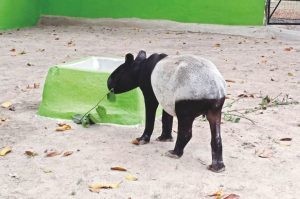Alipore Zoo Under Scrutiny: The Alipore Zoological Garden in Kolkata, often celebrated as the oldest zoo in India, has long been a symbol of Bengal’s love for nature and wildlife. Established in 1876, the zoo has been home to countless species, many of which have played crucial roles in India’s conservation history. It was once the proud residence of Adwaita, a giant Aldabra tortoise believed to have lived more than 250 years.
But recent developments have cast a long shadow on this heritage institution. A Central Zoo Authority (CZA) probe has revealed disturbing lapses in animal sourcing, transfers, and record-keeping, triggering concerns about governance, transparency, and wildlife protection at one of India’s most prominent zoological facilities.

The Trigger: Missing Animals and Public Outcry
The controversy began when discrepancies surfaced in zoo inventory records. According to documents, the end-of-year stock for 2023-24 listed 672 animals, but the opening balance for 2024-25 suddenly showed only 351 animals.
Such a drastic mismatch—over 300 animals seemingly unaccounted for—sparked outrage. A Public Interest Litigation (PIL) was soon filed in the Calcutta High Court, alleging negligence, mismanagement, and even the possibility of illegal wildlife trade.
Civil society groups argued that the sudden “disappearance” of so many animals could not be brushed aside as clerical errors. The uproar compelled both the CZA and the West Bengal Forest Department to step in.


CZA Findings: A Deeply Troubling Picture
The CZA audit panel, which examined records at Alipore Zoo, reported multiple irregularities:
- Lack of Stock Registers: No systematic register was maintained as required under the Recognition of Zoo Rules, 2009.
- Missing Animal History Cards: Many animals lacked detailed health, origin, and breeding records.
- Unapproved Acquisitions and Transfers: Species such as wild dogs, gharials, and exotic birds were moved without proper authorization.
- Deaths Without Documentation: In cases of animal mortality, necropsy reports were not recorded or uploaded, leaving questions unanswered.
- Unexplained Species Discrepancies: Numbers for species like hill mynas and pheasants did not match across records.
Officials at the zoo claimed that the discrepancy in numbers stemmed from “errors in uploading data” into the national digital inventory system. But for conservationists, such explanations highlight a deeper malaise—systemic negligence and lack of accountability.
Alipore Zoo Under Scrutiny: State Government and Legal Intervention
The West Bengal Forest Department, which oversees the zoo, has announced its own inquiry. Chief Wildlife Warden officials confirmed that corrective steps are being initiated to ensure compliance with record-keeping norms.


Meanwhile, the Calcutta High Court has taken a strong stance. In addition to hearing the PIL on missing animals, it has stayed a controversial proposal to sell three acres of zoo land, which included an animal hospital and aquarium. Judges argued that the lack of proper animal records makes such land diversion even more problematic, raising questions of environmental and legal violations.
Beyond Alipore: A Wider Pattern
The controversy has also revealed that Alipore Zoo is not alone. Preliminary reviews by the CZA found similar mismatches at other zoos in Bengal, including Harinalaya Eco Park Zoo and Bardhaman Zoo.
This suggests that the problem may not just be about one institution but reflects broader administrative lapses in zoo management across the state.
Why Accurate Records Matter
At first glance, poor record-keeping may appear to be a bureaucratic failure. But in the context of zoos, the stakes are much higher:
- Animal Welfare: Missing history cards mean veterinarians cannot track medical treatments, leading to compromised health care.
- Conservation Programs: Breeding endangered species like tigers or gharials requires precise lineage records. Errors can derail years of effort.
- Legal Compliance: Unauthorized transfers may violate the Wildlife Protection Act, 1972 and CZA rules.
- Public Trust: As Kolkata’s most visited zoo, Alipore relies on public goodwill. Scandals undermine its reputation.
- Global Reputation: India is a signatory to multiple international agreements on biodiversity and animal care, including CITES (Convention on International Trade in Endangered Species). Failures here damage India’s image abroad.
The Emotional Toll: Citizens Demand Accountability
For many Kolkatans, the zoo is not just a tourist attraction—it is part of their childhood memories. Families visit during winter picnics, school excursions, and holidays. The news of administrative lapses has therefore caused not only anger but also deep emotional disappointment.
Local conservation groups have demanded independent monitoring, while wildlife activists are calling for greater transparency through real-time online inventories.
A Way Forward: Reforms and Hope
Experts believe that the Alipore Zoo crisis should be treated as a wake-up call. Some of the reforms under discussion include:
- Digitized, Publicly Accessible Animal Records to restore transparency.
- Mandatory Third-Party Audits by independent conservation organizations.
- Strengthened Oversight by both the CZA and state forest departments.
- Capacity Building for zoo staff to handle modern compliance standards.
- Collaboration with Universities for research-based management.
If these steps are implemented, the zoo could not only recover its lost credibility but also emerge as a model for ethical wildlife management in India.
Conclusion: A Test for Conservation Governance
The unfolding controversy at Alipore Zoo underscores a difficult truth: heritage alone cannot guarantee credibility. Without rigorous governance, transparency, and ethical responsibility, even the most prestigious institutions can falter.
For Kolkata, a city that prides itself on its cultural and ecological heritage, restoring order at Alipore Zoo is not just about saving face—it is about protecting the future of India’s wildlife.
🔗 For Further Reading:
- Central Zoo Authority – Official Website
- Wildlife Protection Act, 1972 – Ministry of Environment
- Convention on International Trade in Endangered Species (CITES)

